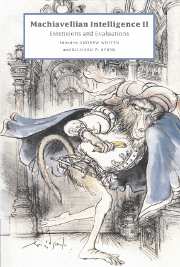Book contents
- Frontmatter
- Contents
- Contributors
- Preface
- 1 Machiavellian intelligence
- 2 Friendships, alliances, reciprocity and repair
- 3 Why Machiavellian intelligence may not be Machiavellian
- 4 Social intelligence and success: Don't be too clever in order to be smart
- 5 Minding the behaviour of deception
- 6 The Machiavellian mindreader
- 7 Exploiting the expertise of others
- 8 Primates' knowledge of their natural habitat: As indicated in foraging
- 9 Evolution of the social brain
- 10 The modulatory of social intelligence
- 11 The Technical Intelligence hypothesis: An additional evolutionary stimulus to intelligence?
- 12 Protean primates: The evolution of adaptive unpredictability in competition and courtship
- 13 Egalitarian behaviour and the evolution of political intelligence
- 14 Social intelligence and language: Another Rubicon
- Index
2 - Friendships, alliances, reciprocity and repair
Published online by Cambridge University Press: 23 November 2009
- Frontmatter
- Contents
- Contributors
- Preface
- 1 Machiavellian intelligence
- 2 Friendships, alliances, reciprocity and repair
- 3 Why Machiavellian intelligence may not be Machiavellian
- 4 Social intelligence and success: Don't be too clever in order to be smart
- 5 Minding the behaviour of deception
- 6 The Machiavellian mindreader
- 7 Exploiting the expertise of others
- 8 Primates' knowledge of their natural habitat: As indicated in foraging
- 9 Evolution of the social brain
- 10 The modulatory of social intelligence
- 11 The Technical Intelligence hypothesis: An additional evolutionary stimulus to intelligence?
- 12 Protean primates: The evolution of adaptive unpredictability in competition and courtship
- 13 Egalitarian behaviour and the evolution of political intelligence
- 14 Social intelligence and language: Another Rubicon
- Index
Summary
Sociality is not limited to primates. Other animals, such as corals and colonial hydrozoans, are far more impressively social in the extent to which individuals co-operate, even forsaking their autonomies, as part of a colonial ‘superorganism’ (Wilson, 1975). To consider the hypothesis that primate intelligence evolved in response to the demands of social life therefore requires us to do more than identify common aspects of sociality in this order: we should identify ways in which primate social systems differ from those of other animals.
All primates are social, but not all are gregarious. Gregarious primates live in groups that typically persist beyond the lifetimes of their individual members. These groups are largely ‘closed’, in that entrance of strangers is resisted. The most distinctive features of primate societies, however, are that their members (a) recognise and interact with one another as individuals (b) over the course of relatively long lifetimes in such a way that (c) earlier interactions influence later ones. Thus every individual is part of a network of individualised social relationships, and each relationship has a unique and potentially long history. Because the occurrence and outcomes of interactions between individuals at one time may influence the occurrence and outcome of their subsequent interactions, the pair's history of interaction becomes one relevant factor in predicting the future course of the relationship by observers and by the animals themselves.
Members of non-human primate groups have social relationships with each of their group-mates, although these relationships vary in form.
- Type
- Chapter
- Information
- Machiavellian Intelligence IIExtensions and Evaluations, pp. 24 - 49Publisher: Cambridge University PressPrint publication year: 1997
- 69
- Cited by



